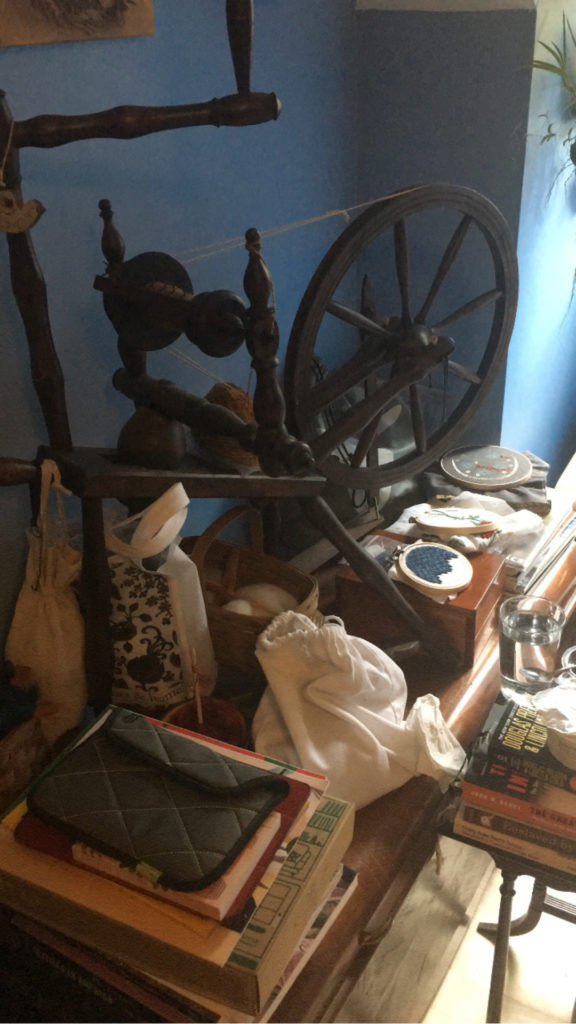A Year Without Events
I certainly didn’t expect 2020 to be ending this way, and looking back at my post from May, I really wasn’t prepared for *everything* to be cancelled (either officially or unofficially because it seemed too risky to me).

The grainy nature of the photo and it’s wonky white balance and exposure kind of encapsulates the general weirdness I’ve been feeling most of the year.
I’ve finally managed to finish the dark blue check linen apron I started ages ago. The cap and the patchwork pocket are still not finished, and I’ve added an embroidered pocket and a flame stitch pinball to my pile of history projects. There’s even some modern embroidery there. I finished a couple of books, but added even more to the stack. And we won’t even start on the spinning projects that are still in progress. I can focus better than earlier in the year, but everything still feels *odd*. And sleep is still a bit wonky, despite my best efforts.
It’s been especially strange to have nothing on my calendar in October (traditionally my busiest month for events) or for the first part of December. I’ve usually got Christmas programs taking all of my time the first two weekends of the month, and a bit of last minute chaos at work before the holidays. Still have the work chaos, but no dancing in the Third Factory at Duke Homestead or making stollen at Alamance Battleground.
But it was during one of those sleepless nights that I figured out some of what’s been bugging me during this Year Without Events. My 2020 schedule was going to be “lighter” than 2019 – I was going to limit myself to 2 events a month (with a few exceptions) so that I could have more down time. I’d begun to feel like I was racing through the week to get to the next event and never getting a break in 2019, and with all the life changes that year threw at me, something needed to change. But the trick is, even two-ish events a month would provide significant structure and rhythm to my life. By February, I already had the better part of the year planned and booked and events on my work calendar. When events started getting cancelled, my elaborate schedule started falling apart, and I felt adrift. I still haven’t figured out a way to set a rhythm for myself without events. And at the same time, I’ve felt like not being constantly busy and working on projects has been time wasted.
I’ve also come to realize that a big part of why I enjoy events (and have been so willing to devote so much time, money, and energy that I don’t always have to them) is because of the opportunities for meaningful connections. I have good friends that I see more or less only at events. Some folks travel hours to come hang out and share their knowledge with other interpreters and folks visiting the site we’re at for the day or weekend. And then there’s the after hours social time, sitting around a fire eating, drinking, and talking about all sorts of things. I get to see the spark of learning and wonder in the eyes of visitors. It’s there in the 40-ish year old engineer crouched down next to my spinning wheel, wanting me to explain again how a part works because it seems like magic. It’s there in the crowd of 4th graders sitting around me listening as I explain historic clothing. It’s there in the grandma that’s doing her best to sneak a taste of whatever we’ve been working on cooking over the fire, in the hearth, or on the cast iron stove. It just takes one, even if I’m bone tired, to make me willing to come back and do it all again in a few weeks time.
In a lot of ways, my day job is often a means to an end for my interpretation. A (mostly) Monday to Friday, 9-5 job gives me the weekends and the money to invest in living history/historical interpretation. My boss is supportive of my events, and doesn’t mind when I work a half day (again) on a Friday so I can go home, pack, and get on the road before dark. I’d even be willing to make the argument that the fact that interpretation is *not* my day job makes me better at it. It’s something I have to make space for. I’m shielded from most of the bureaucracy. I can *choose* to not go to an event if I’m sick, or I don’t feel conditions are safe, or even if I just can’t deal with people right now. But it’s still work. Volunteer work, but work none the less. And if nothing else, Covid has shown me that perhaps its time to restructure that work, on both a personal and a cultural level.
So where does this leave me?
There’s a good chance much of the first half of the year will not have events again. So I need to come up with a way to create my own structure, regardless of events being on the calendar. I don’t want to feel like I’ve wasted the time, but also don’t want to run myself ragged. I need to find a way to create the meaningful connections that I’ve been missing. That may mean learning new tech, or at least further embracing the tech I already know. And it means starting the conversations with others about how we want living history/historical interpretation to look when we come out the other side.
